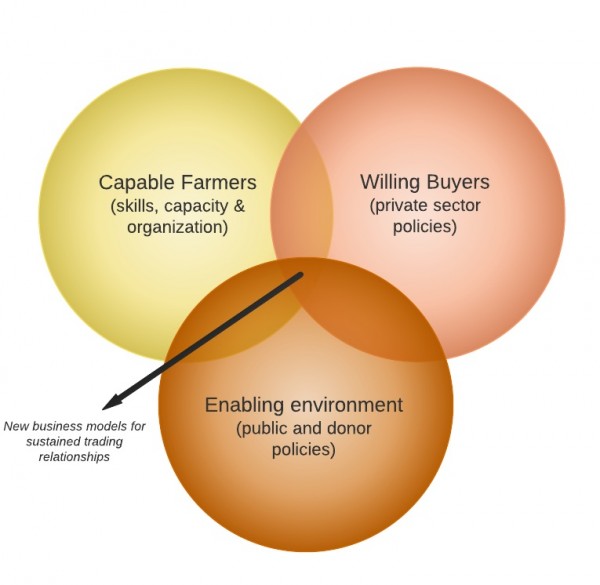by Michael Sheridan of CRS Coffeelands Blog
It’s a word that makes many people in coffee uncomfortable: Policy.
Ric Rhinehart spoke during Sustainable Harvest‘s 2014 Let’s Talk Coffee event to the importance of public policy in shaping the composition of the coffee sector in growing countries. (Ric and I further explored the implications of policy for the future of coffee in Mesoamerica in an illuminating conversation here.)
More recently, I suggested here that, whether we like it or not, policy shapes the way we engage all along the coffee chain, from origin to the marketplace. And last week’s outstanding SCAA events in Seattle surfaced plenty of big, thorny issues in sustainability — all of which are too big for the coffee community to solve alone, and all of which require enlightened public policy to address in any meaningful, lasting way.
Our friends at CIAT — the International Center of Tropical Agriculture — are fond of this Venn diagram, which helpfully underscores the importance of policy for achieving lasting change in the coffeelands:
As the reference to new business models suggests, it comes out of CIAT’s work linking farmers to markets. Indeed, the framework may be most valuable in the context of trading relationships. But it is no less valid for all the threats to the sustainability of the specialty coffee supply chain that made “the origin agenda
” of The SCAA Event: smallholder profitability, farmworker protections, gender equality, incentives for environmental conservation, price risk mitigation, effective engagement of the next generation of coffee growers, coffee breeding and research, cup quality, and — most important of all — climate change.
During some of the breakout sessions during the SCAA Symposium last week, there was some despair about the magnitude of the challenges specialty coffee faces. And if specialty coffee had to solve them alone, I think despair would be an appropriate response. But it doesn’t. Indeed, it can’t. As the CIAT diagram suggests, sustainable change is a three-legged stool. Industry may lead the charge, but enabling environment to catalyze, scale and sustain supply chain innovations is critical. What I see as cause for encouragement over despair is that so much of what specialty is working hard to achieve on the ground in the coffeelands — thriving smallholder economies, production systems that conserve and enrich ecosystems, fair treatment of farmworkers — are just the kinds of outcomes policymakers in growing countries want to deliver.
Policy is messy. My own modest experience in trying to influence policy suggests the process is decidedly non-linear and can be uniquely frustrating. But the successes, when they come, aren’t just sweet — they attach that third leg the stool and stabilize our efforts to generate positive financial, environmental and social returns on our joint investment in the coffee trade.
In the coming weeks, I will take up some of the big issues in sustainability mentioned above with a particular focus on policy.
Michael Sheridan
Michael Sheridan is the Chief Executive Officer of the Coffee Quality Institute, a nonprofit organization with a mission to improve coffee quality and the lives of those who produce it. Sheridan has been leveraging market forces to make coffee work for smallholder farmers and farm workers since 2004. Most recently he directed progressive green coffee sourcing activities and direct-trade partnerships at Intelligentsia Coffee. Prior to that he worked to deliver initiatives in the coffee sector in Central and South America on behalf of Catholic Relief Services.
Comment
2 Comments
Comments are closed.







Great lead-in for policy discussions. Looking forward to reading your future posts on this topic. It would be great if you use one article to focus on certification policies (Rainforest Alliance, FairTrade, etc.) and how you see the larger industry evolving around these.
After three years working in and for sustainable coffee, I have only just come across Meridan’s blog, which I am enjoying.
I’d like to see the discussion around sustainability in coffee shift to the producer perspective. What is their take on all the sustainability topics?